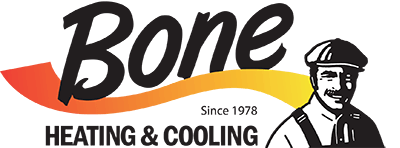
The popularity of heat pumps has skyrocketed in recent years because they are extremely energy efficient. Another major advantage is that heat pumps can provide both heating and air conditioning. In this article, we’ll show you exactly how heat pumps work, why they’re so efficient and why they’re such a great option.
How Heat Pumps Cool and Heat
Heat naturally travels from warm areas to cooler ones. A heat pump uses this principle to transfer heat to the inside of a cool home in the winter and withdraw the heat from a warm home in the summer. Refrigerant is the medium that contains the radiant heat.
In the winter, the indoor air handler’s coil contains a very hot gaseous form of refrigerant. As the cold room air flows over the hot refrigerant, the heat transfers from the refrigerant to the cool air, and the warm air blows into the room. Meanwhile, the refrigerant has lost its heat, transformed into a cool liquid and flows back to the outside unit. Once outside, the refrigerant is cooled so that it is colder than the outside air and can absorb heat from the winter chill. The refrigerant is compressed, transformed into a hot gas, flows back inside, and the warming cycle starts again.
In the summer, the indoor air handler’s coil contains a cold refrigerant. As the warm room air flows over the cold refrigerant, the heat transfers from the warm air to the cold refrigerant, and the cool air blows into the room. The warm refrigerant flows to the outside compressor, becomes hotter than the outside air, flows over the coils and releases the radiant heat to the outside environment. The cooled refrigerant flows back into the air handler, and the cooling cycle starts again.
Comparing the Efficiency of Heat Pumps and Other Heating Options
The heat transfer process we just explained is what makes heat pumps so energy efficient. There is no difference in the energy efficiency of a heat pump and a central air conditioner since they work the same. Of course, two units could have different efficient ratings and use more or less energy. However, if you compare a heat pump and a central AC that have the same SEER rating and are the same size, they will always use the same amount of energy.
The difference is when you compare heat pumps to other heating units like gas furnaces, electric furnaces and electric baseboard heaters. Gas furnaces range between 80% and 98% efficiency. Electric heaters are generally always 100% efficient since they directly change electricity into heat energy. Most heat pumps are around 300% efficient. This is because instead of directly using electricity to produce heat, the electricity is used to power the heat transfer process and move the refrigerant through the system.
The effectiveness and energy usage of a heat pump can fluctuate depending on the outdoor air temperature. A heat pump works most effectively in temperatures of 40 degrees or higher, and energy usage can increase in colder temperatures because there is less heat for the heat pump to capture when the air is much colder. As a result, the heat pump may run longer, consuming more energy, as it strains to maintain the thermostat setting.
How Well Do Heat Pumps Work in Cold Weather?
A cold-climate heat pump can typically keep running and producing at least some heat in temperatures as low as -10 to -20 degrees. However, any heat pump system in a colder climate must also have an auxiliary heat source. Most cold-climate heat pumps have electric heat strips that are installed in the air handler inside, but you could also use an existing furnace for auxiliary heating.
The auxiliary heating will run when the temperature is so cold that the heat pump can’t work. It will also switch on for a short time, between every 30 minutes and two hours when the heat pump runs its defrost cycle, which melts the ice on the coil. If your home is more than 3-5 degrees below the desired temperature, the heat pump and auxiliary heating will run to heat the home more quickly. The auxiliary heating will automatically shut off once the temperature is within a degree or two of the desired temperature.
The auxiliary heat source will always use more energy than the heat pump. However, unless it has to run the majority of the time, a heat pump will always cost you much less to use than any other type of heating.
At Bone Heating & Cooling, we’re a Lennox Premier Dealer and can help if you need a new heat pump, AC or furnace. We also offer professional heating repairs and maintenance in Festus and throughout the St. Louis area. Give Bone Heating & Cooling a call to schedule a consultation and learn if a heat pump is right for your home or to schedule any other heating or cooling.

